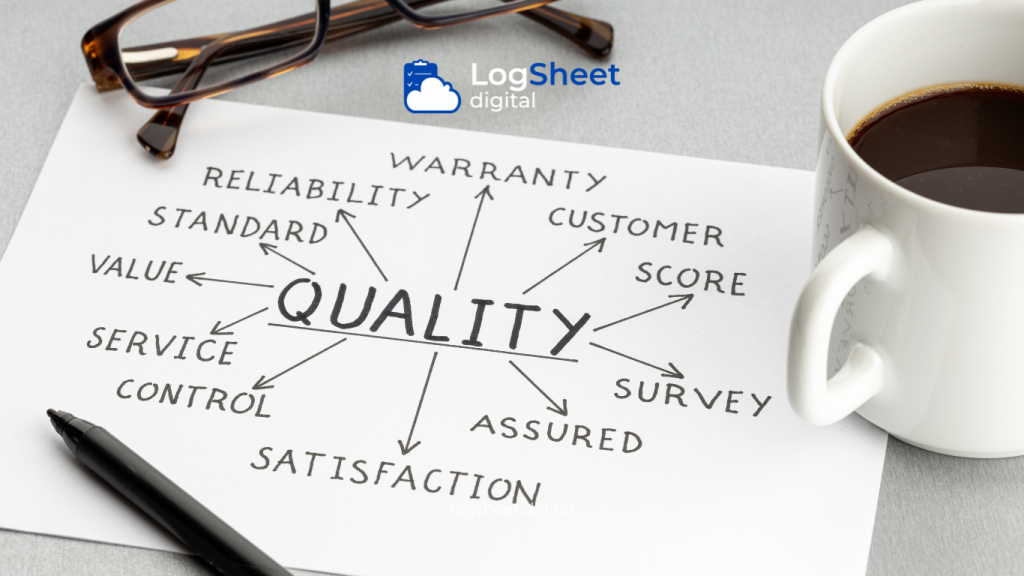In the era of Industry 4.0, business competition is increasingly fierce. Manufacturing companies are required to produce high-quality, consistent, and efficient products. One key to success is the implementation of an effective quality control system. Digital logsheets emerge as an innovative solution that optimizes the quality monitoring process and provides deeper insights into production performance.
Challenges in Conventional Quality Control

Read more: Digital Transformation in Quality Control: The Role of Digital Logsheets in Industry
Before the digital era, teams performed quality control manually using paper or spreadsheets. This method had several drawbacks, including:
- Low Efficiency: Data recording processes took a long time and were prone to human errors.
- Lack of Visibility: It was difficult to obtain a comprehensive view of production performance in real-time.
- Limited Data Analysis: Recorded data was hard to analyze in depth to identify root causes of quality issues.
- Collaboration Limitations: Sharing information and collaborating across different teams was challenging.
Digital Logsheets: A Comprehensive Solution

Read more: Enhancing Industry Safety through Digital Logsheets on Safety Equipment
Digital logsheets are computer or cloud-based applications used to record, track, and analyze product quality data digitally. Leveraging information technology, digital logging offers several significant benefits:
- Increased Efficiency: Data recording processes become faster and more accurate, saving time and resources.
- Better Visibility: Quality data can be accessed in real-time and presented in easy-to-understand visual formats.
- In-Depth Data Analysis: Digital logsheets allow for more complex data analysis, identifying trends, and uncovering root causes of quality issues.
- More Effective Collaboration: Production, quality, and engineering teams can collaborate more efficiently by sharing data and information through the same platform.
- Regulatory Compliance: Digital logging helps companies meet applicable regulatory requirements, such as ISO 9001.
Key Features of Digital Logsheets

Read more: Digital Logsheets: Accurate Data Analysis & Right Decisions
- Customization: Digital logsheet can be tailored to the specific needs of each company, including product types, production processes, and quality metrics used.
- Integration: Digital logsheet can be integrated with ERP, MES, and other systems to create a connected data ecosystem.
- Automated Reporting: The system can generate quality reports automatically, whether in table, graph, or dashboard formats.
- Notifications: The system can send real-time notifications if deviations from set tolerances occur.
- Predictive Analytics: Using machine learning algorithms, digital logsheet can predict potential future quality issues.
Implementing Digital Logsheets

Read more: Optimal Quality: Digital Logsheets & Raw Materials
To implement digital logsheet effectively, companies need to follow several steps:
- Needs Analysis: Identify production processes that will use digital logging and determine the quality metrics to be measured.
- Software Selection: Choose digital logging software that matches the company’s needs and budget.
- Employee Training: Train employees to use the digital logsheet software effectively.
- Data Migration: Migrate existing quality data from the old system to the new one.
- Evaluation and Improvement: Conduct regular evaluations to ensure that digital logging provides optimal benefits and continuously make improvements as needed.
Case Study: Improving Production Efficiency at XYZ Automotive Plant

Read more: Foundations of Health: Digital Logsheets in Production Planning
Background
PT. XYZ Automotive is a vehicle manufacturing company facing challenges in maintaining product quality consistency amid increasing market demand. The team recorded quality data manually, which made the process prone to errors and difficult to analyze in depth.
Solution
To address these issues, PT. XYZ Automotive implemented a digital logsheets system integrated with their production system. This system allows each production line worker to record quality data in real-time using mobile devices. The system automatically processes the recorded data and presents it in a dashboard that management can easily understand.
Results
After implementing digital logging, PT. XYZ Automotive achieved several significant results:
- Increased Efficiency: Time required to record and analyze quality data was reduced by up to 50%.
- Improved Data Accuracy: Error rates in data recording dropped significantly, making the data more accurate and reliable.
- Faster Problem Identification: The system can detect anomalies in quality data in real time, allowing teams to identify and address issues more quickly.
- Reduced Defective Products: With deeper data analysis, the company could identify root causes of quality problems and take appropriate corrective actions, reducing the number of defective products.
- Enhanced Customer Satisfaction: Improved product quality directly impacted customer satisfaction and the company’s reputation.
Lessons Learned
This case study demonstrates that digital logging can significantly contribute to improving production efficiency and product quality. By leveraging information technology, companies can optimize business processes and achieve competitive advantage.
Conclusion

Read more: Improving Quality Control Accuracy with Digital Logsheets
Digital logsheets have proven to be an effective solution for enhancing quality monitoring and analysis in the manufacturing industry. By leveraging information technology, companies can improve efficiency, accuracy, and visibility in managing product quality. Additionally, digital logsheets can provide valuable insights for strategic decision-making.
Digital logsheets are not just a technological upgrade; they represent a strategic step towards continuous improvement in quality management processes.






comments (0)